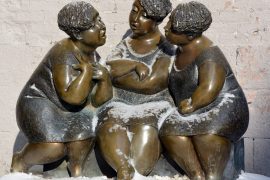The world has gone cannabis crazy.
It is in the news all the time. Should it be legalised? Is medicinal cannabis beneficial? Is cannabis dangerous?
Patients come to me every day asking if they should try cannabis oils for various ailments. For many of the conditions, like chronic pain or insomnia, they have tried several medications and have been disappointed with the results or struggled with side effects. It is not a wonder that they want to try something “natural” since modern medicine has disappointed them so.
Anecdotal evidence and various oil providers will tell you that cannabinoid oils are hugely beneficial for a host of problems including cancer, weight loss in chronic illnesses, fibromyalgia, arthritic pain and inflammation, Parkinson’s, migraines, epilepsy, glaucoma, sleep problems, anxiety, IBS and PTSD. It might be worth noting that your friendly herbalist might not be Big Pharma, but is in the business of selling of cannabinoid oils for profits. Thus they have an invested interest in promoting its proven and unproven benefits.
What are the proven benefits? What does current best evidence for the use of medicinal cannabis say? Scientists led by Penny Whiting from Bristol University released a report on cannabinoids for medicinal use – a very thorough review that found:
- Substantive evidence for the value of cannabis in the management of chronic pain, spasticity in multiple sclerosis, and as an antiemetic for patients on chemotherapy.
- Moderate evidence for its benefits in managing sleep problems (especially insomnia related to pain and sleep apnea).
- Limited evidence that it helps with appetite loss in conditions such as HIV and multiple sclerosis.
- Minimal evidence to date that it helps with Tourette’s syndrome, PTSD or anxiety.
- It does not work for glaucoma.
Unfortunately, the majority of studies involving medical marijuana are of lesser quality, biased, and produce unreliable results. The Whiting report tried to weigh up what evidence there is.
Which cannabinoids should be used at what doses for which conditions? The problem is that we don’t know. It’s this not knowing, perhaps more than the legality of the situation, which makes doctors twitchy about recommending it.
We get Phyto-cannabis strains such as Sativa, Indica and Ruderalis (i.e. dope plants), which have varying concentrations of THC and CBDs. THC (Tetrahydrocannabinol) is the cannabis compound that makes one “high”. CBDs are the cannabinoids, of which there are several, which reportedly have beneficial effects. We also have an endocannabinoid system in our bodies – cannabis receptors that help to modulate our nervous system and influence our immune systems. The idea behind cannabis oil is that the beneficial CBDs are extracted and sold in oils, and most of the THCs are left behind. Thus you cannot get high or addicted to cannabis oils for medicinal use.
Synthetic cannabinoids for medical use are made by pharmaceuticals and registered for specific conditions, e.g. Dronabinol for nausea and vomiting with chemotherapy, Cesamet for chronic pain and Sativex for neuropathic pain. There has been efficacy with these drugs, but perhaps not to the extent hoped for.
Illegal synthetic cannabis, commonly called Spice or K2, is also available. These don’t show up in urine tests for cannabis. While it’s very hard to smoke yourself to death on weed, there have been fatal overdoses on synthetic cannabis.
On the face of it, Big Pharma cannabis seems to be less efficacious and have more side effects than the largely anecdotal reports from the medicinal cannabis community. Doctors and the MCC (Medicines Controls Council) struggle to make sensible recommendations because there is not enough unbiased information. How do we reconcile this with the anecdotal reports of the medicinal benefits of weed?
Dr David Casaret, an American physician, argues that much of the benefit of legalising marijuana for medical use (as has happened in many US states over the last few years) has come from the patient staying in control. A patient struggling with something like chronic pain will take enough dope to feel its effects, but not enough to get high. Paradoxically, it seems as if the beneficial effects are nullified if the dose is too high. The patient adjusts the dose according to how they are feeling. At some point, the efficacy drops, then the patient leaves it for a week or two, and when they try it once more it seems to work again. Used in this way it seems to be efficacious with few side effects. Again, this is anecdotal – what the patients in the medical marijuana dispensaries are saying. But when patients respond variably to several compounds it is difficult to set up a standardised trial.
So, why not just legalise medical cannabis and let people get on with figuring out what works for them? This is a hugely contentious issue in SA at the moment and being hotly debated in our courts and on our streets.
It seems to me that both sides of the fight aren’t entirely honest about their motivations. Many of the most strident proponents of legalising medical cannabis just want the right to freely light up a spliff. If marijuana were to be completely unlegislated, we would have to acknowledge the increased risk of psychosis and the added burden on our mental health services. However, to make it completely illegal and let a rebellious teenager have a criminal record for experimenting seems equally ludicrous.








2 Comments
I am not a doctor or a pharmacist so I am not held to the same ethical account therefore I feel no compunction in taking a stand on this matter as far as the bipolar, schizoaffective and the occasional schizophrenic patients who wonder into our group are concerned. Chronic or even occasional use of Cannabis sativa is associated with destabilizing otherwise stable patients and in precipitating psychotic episodes. There is no way that anyone could do a clinical trial to demonstrate this as giving an illegal substance to already diagnosed psychiatric patients would never meet ethics committee approval. Please therefore take my word for it that we have seen too many cases of people using Cannabis and then falling off the wagon for the link to be only coincidental. So if you have been diagnosed with a disorder in which psychosis can potentially feature, just be safe and stay off the grass.
I am so pleased that you brought this up, David. I did mention that there is a clear link between cannabis use and psychosis, but it is well worth mentioning again. Schizophrenia is 1% in the general population, 5% in the adolescent cannabis using population- that’s five times increased risk for a very serious illness. The risk is not there with the cannabinoid oils (without thc). But if we make medical marijuana freely available, it is going to be hard to police general cannabis use. General cannabis use will put the most vulnerable population group at further risk.